AI shaping tomorrow's world at Imperial Fringe
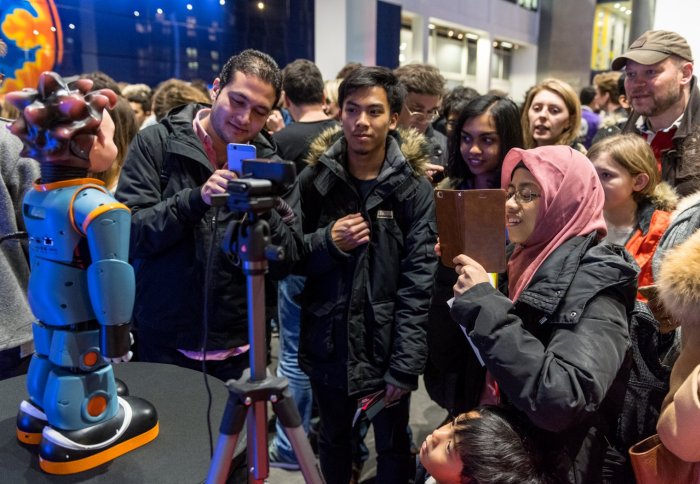
Hundreds of visitors explored the exciting possibilities of artificial intelligence at the latest Imperial Fringe event.
The ‘Intelligence Redesigned’ event welcomed members of the public to discover the latest developments and applications in artificial intelligence (AI), from virtual personal assistants and electronic heart surgeons to a robotic companion for autistic children with a knack for impressions. This followed the launch event for the AI@Imperial Network, which will bring together experts from engineering, science, healthcare and business. Here are some of the evening’s highlights:
A robot helping autistic children understand emotions
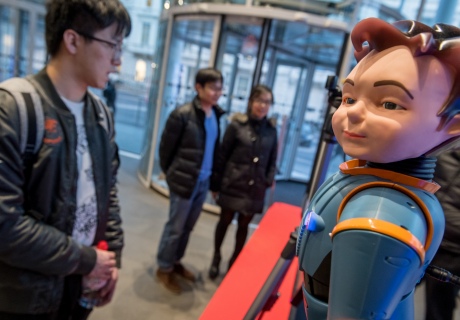 Professor Maja Pantic and her team in the Department of Computing are part of a major collaboration to help children with autism develop their learning and emotional understanding skills with the help of Zeno the robot.
Professor Maja Pantic and her team in the Department of Computing are part of a major collaboration to help children with autism develop their learning and emotional understanding skills with the help of Zeno the robot.
The technology behind Zeno combines audio, visual, facial recognition and artificial intelligence technologies to detect and decipher sound and visual cues from children − allowing it to spontaneously interact in real-time and conduct a simple lesson.
Electronic heart surgeons
Visitors met the machines teaching themselves to spot the early signs of heart failure. Dr Declan O’Regan and Professor Daniel Rueckert, with their colleagues in the Institute of Clinical Sciences and the Department of Computing, are using machine learning to analyse moving images of the heart to accurately predict how long individual patients with heart complications will live. This could identify which patients need more aggressive treatment.
The team has recently started a BHF New Horizons project to develop this technology and evaluate it at hospitals in the UK and beyond. Dr O’Regan said: “We hope that in the next few years we will be able to seamlessly integrate information from imaging, genetics and blood tests in real-time to guide which treatments will be most effective.”
A personal assistant that tailors its personality to its owner
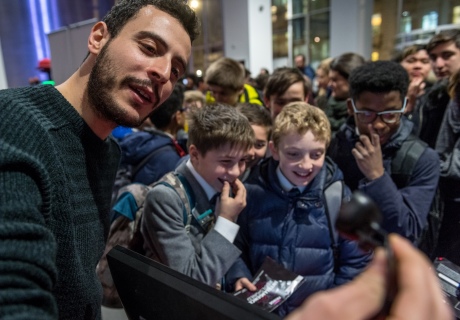 Olly, a personal assistant for the home that learns its owner’s behaviour and creates its personality based on theirs, has been developed by the Department of Computing’s Zafeirios Fountas and robotics start-up EmoTech.
Olly, a personal assistant for the home that learns its owner’s behaviour and creates its personality based on theirs, has been developed by the Department of Computing’s Zafeirios Fountas and robotics start-up EmoTech.
Olly is the first home robot with an evolving personality that adapts to each individual. Olly’s advanced machine learning technology proactively assists its owner with their day-to-day routine by remembering their habits. Olly’s unique brain-inspired AI system also enables it to understand emotion and adapt to the world around it.
3D face scanner to help improve reconstruction
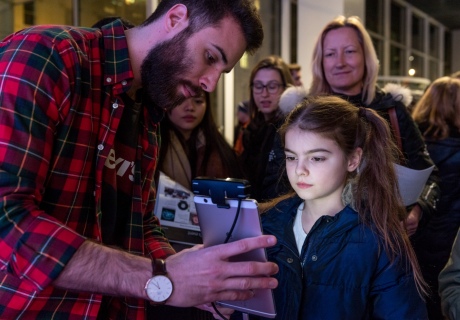 Visitors were able to have their face 3D scanned by Machine Learning expert Stefanos Zafeiriou from the Department of Computing as part of a research study to record and measure the subtle differences in people’s facial expressions.
Visitors were able to have their face 3D scanned by Machine Learning expert Stefanos Zafeiriou from the Department of Computing as part of a research study to record and measure the subtle differences in people’s facial expressions.
The results of the study may be used to help develop technology to aid in the diagnosis and treatment of medical conditions that affect the face. The study could also help develop new facial recognition technologies and improve facial expressions seen in computer games.
The quick-learning Robot DE NIRO
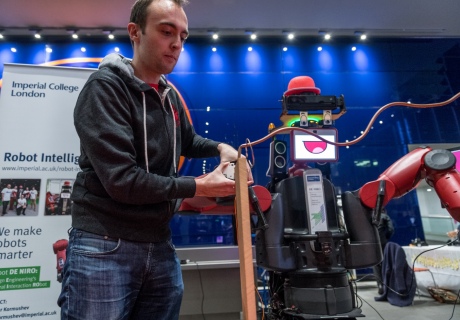 Members of the public witnessed real-time learning by Robot DE NIRO, the Dyson School of Design Engineering’s smiley, long-armed Natural Interaction Robot. The largest robot in Imperial’s Robot Intelligence Lab, Robot DE NIRO uses machine learning to master tasks such as shooting a hockey puck and working collaboratively with a human to move a large object.
Members of the public witnessed real-time learning by Robot DE NIRO, the Dyson School of Design Engineering’s smiley, long-armed Natural Interaction Robot. The largest robot in Imperial’s Robot Intelligence Lab, Robot DE NIRO uses machine learning to master tasks such as shooting a hockey puck and working collaboratively with a human to move a large object.
Accompanied by Director of the Robot Intelligence Lab Dr Petar Kormushev, Robot DE NIRO attempted the buzz-wire task, quickly learning from initial errors to complete the task perfectly.
Testing mental skills with AI
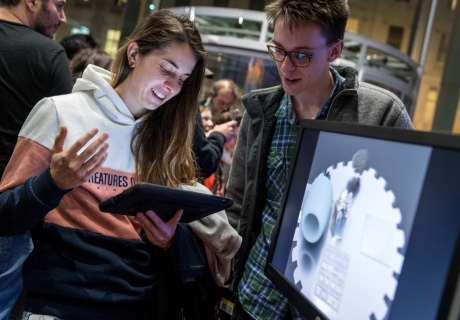 Visitors tested their mental skills with a tool called Cognitron, the first artificial intelligence whose sole purpose is to learn about human intelligence. Visitors completed a sequence of tasks on a tablet, which fed into an AI web server. Cognitron starts with conventional cognitive tests, then progressively designs exercises better suited to measure the different types of intelligence based on what it learns from the test participants.
Visitors tested their mental skills with a tool called Cognitron, the first artificial intelligence whose sole purpose is to learn about human intelligence. Visitors completed a sequence of tasks on a tablet, which fed into an AI web server. Cognitron starts with conventional cognitive tests, then progressively designs exercises better suited to measure the different types of intelligence based on what it learns from the test participants.
The project, led by the Department of Medicine’s Dr Adam Hampshire and honorary lecturer Dr Peter Hellyer, is using AI to identify different types of human intelligence.
Researcher Dr Romy Lorenz, who is involved in the project, said: “A better understanding of different types of intelligence can help us in the future to tailor training programmes in schools to individual students' needs. It could also help us to improve cognitive rehabilitation programmes for the elderly or patients suffering from cognitive impairments.”
Images credit: Fergus Burnett
Article text (excluding photos or graphics) © Imperial College London.
Photos and graphics subject to third party copyright used with permission or © Imperial College London.
Reporter
Jennie Rawling
Communications and Public Affairs